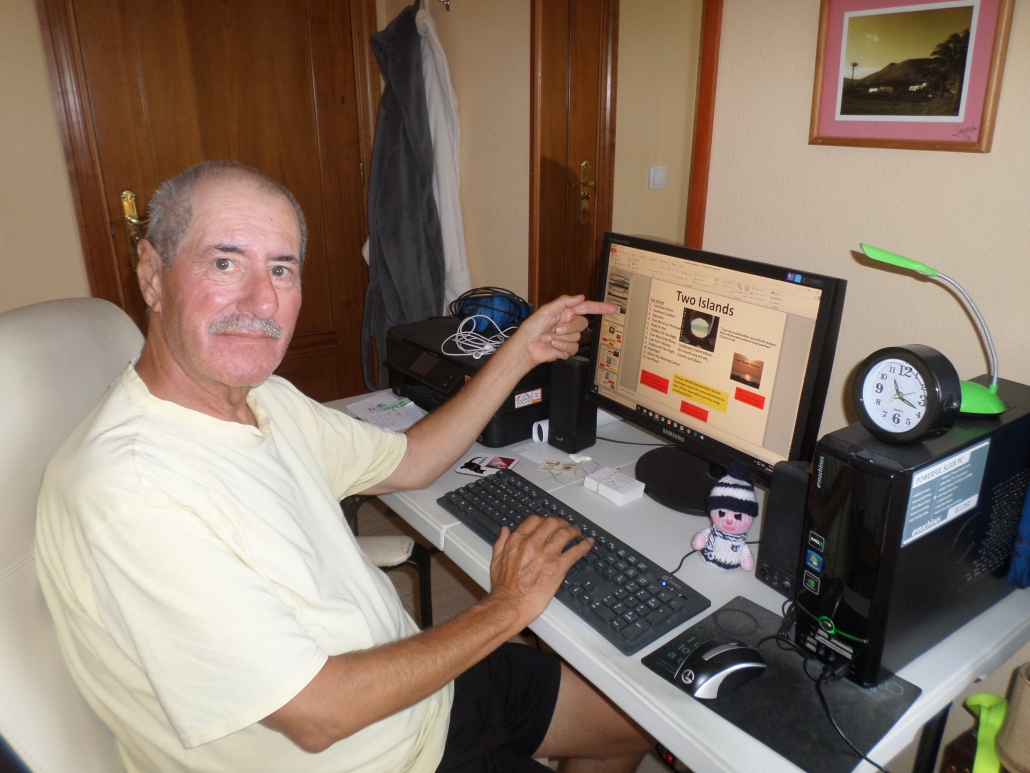A GIFT OF RECOMMENDED READING
A GIFT OF RECOMMENDED READING
a present for all Guardian readers from writer Geoff Dyer and passed on by Norman Warwick

We can read on line that Geoff Dyer is an English writer, born in 1958. He has authored a number of novels and books of non-fiction, which have won literary awards and been translated into 24 languages. Kathryn Schulz, writing in New York, described him as ´one of our greatest living critics, not of the arts but of life itself, and one of our most original writers´. On the Wikipedia site you will find Dyer´s bibliography, awards and a selection of his wit and wisdom. Perhaps even more revealing than this brief biography, though, is an interview he gave, or a list he compiled, for The Guardian of his reading habits. I found it fascinating and the list has gone straight into the top ten with a bullet of a my list of best lists of books, that I will probably call Reading Recommended By Writers.
Dyer opened the box by revealing to his Guardian interviewer that the book he is currently reading is a actually a re-reading.
´I’m in the re-reading phase of my life´, he said. ´Í have Just finished Shirley Hazzard’s The Transit Of Venus for the third time. Quite something, to be freshly overwhelmed by the greatness of a book you’ve read twice before: every page, every paragraph, every sentence.´
It sounds like it might be a book that has changed his life, but Dyer changes direction.
The book that changed my life´, he told readers, ´ís a play in the form of a book in the form of a record, to be precise.
Shakespeare’s Richard III. We were doing it for O-level. A woman my mum worked with at my old junior school liked Shakespeare and had an LP of an edited version of the play with one of those Hammer horror actors, Peter Cushing or Christopher Lee (I forget which), as Richard. She lent it to me and that, combined with the lessons by a wonderful teacher at grammar school, led to my becoming swallowed up in the currents and eddies of language. I still know huge chunks of the play off by heart. The nice thing about this story is that my mum and her friend weren’t teachers at the school; they both worked in the canteen as dinner ladies. It reminds me of that Play for Today from about the same time, Shakespeare or Bust.

Asked what book he wished he´d written, however, Dyer sounded hesitant.
´Impossible to answer honestly except by saying “None”. Naturally, I often find myself wishing that one of my poxy books had sold as many copies as an even poxier one by someone else but, as Walt Whitman (right) put it: ´I find no sweeter fat than sticks to my own bones´.

´John Berger, (left) without a doubt, is the author who has had the greatest influence on me, but I can´t narrow that influence down to a single book since the influence was, precisely, his range and endless formal innovation. Berger’s influence was so strong it actually took me a while, along with multiple transfusions and organ transplants from other writers, to become myself´.
John Peter Berger was an English art critic, novelist, painter and poet. His novel G. won the 1972 Booker Prize, and his essay on art criticism Ways Of Seeing, written as an accompaniment to the BBC series of the same name is, fifty years later, used as a university text.
Dyer served as a judge for a prestigious prize and recalls that he and his fellow judges shortlisted The Name Of The World by Denis Johnson. The other two judges wanted Philip Roth to win for The Human Stain but he persuaded them to give it to Michael Ondaatje for Anil’s Ghost.

Johnson´s novel, published in 2000, tells of a traumatized widower is painfully and gradually recalled to life in this deceptively simple—and surprisingly absorbing—short novel by the well-known poet and author who had written Already dead in 1997.
´Looking back I wish we’d chosen The Name Of The World in recognition of the unfettered wonder of Johnson’s vision but I think we all felt that to give a biennial prize to a 120-page book reflected rather poorly on the state of literary production, that something more substantial was needed: bit daft, really, since genius can’t be measured´.
Dyer seems honest in explain his ´liked´selections and certainly doesn´t hide behind polite when he dismisses those he doesn´t like. One book thaty doesn´t appeal to him is The Adventures of Augie March by Saul Bellow, who is, suggests Dyer, ´both a total bore and an interesting example of the influencer being so much less interesting than the influencee, Martin Amis´.

Asked to name ´The book that changed his mind´ Dyer gave The Gay Science by Nietzsche.
´I suppose it was my mind that was changed,´ he said, before recalling, ´but it felt as if it was the world that changed´.
As if to remind us that he is going through a period of re-reading he says that ´the last book that made me cry was Voyage in the Darkby Jean Rhys, which I recently reread.´
Similarly, though, that was also the book that last made him laugh.
´The point being that a book has to do both, ideally at the same time, in the same sentence even. Like the time when we hear that the protagonist, Anna, sent “a postcard from Blackpool or some such place and all she said on it was, ‘This is a very windy place,’ which doesn’t tell us much about how she is getting on.” God, I love Jean Rhys´.

Voyage in the Dark was written in 1934 by Jean Rhys. It tells of the semi-tragic descent of its young protagonist Anna Morgan, who is moved from her Caribbean home to England by an uncaring stepmother, after the death of her father. Once she leaves school, and she is cut off financially by the stepmother, Hester, Anna tries to support herself as a chorus girl, then becomes involved with an older man named Walter who supports her financially. When he leaves her, she begins a downward spiral. Like William Faulkner’s The Wild Palms, the novel features a botched illegal abortion. Rhys’ original version of Voyage in the Dark ended with Anna dying from this abortion, but she revised it before publication to the more ambivalent and modernist ending in which Anna survives to return to her now-shattered life “all over again.” The novel is rich in Caribbean folklore and tradition and post-colonial identity politics, including black self-identification by its white protagonist.
´And just today´, Dyer tells us, ´ ´´I was reading some stories in The Visiting Privilege by the aptly named Joy Williams. As one of her characters rightly concludes, “Things had to be funny.” They do indeed´.
Dyer´s caustic wit enables him to slice and dice and get away even before the blood has begun to seep out. In naming a book he couldn´t / wouldn´t / didn´t read to the end he nominates Água Viva by Clarice Lispector.
´Not finishing the book was no small achievement,´ he said, ´since it’s only about eighty pages long but I somehow managed to tear myself away with plenty of time to spare.´
He not only spoke of those books he never finished but also of books he never got around to starting. He feels no shame, though.
´I’ve failed to read all the usual ones – Proust, late James, Musil – but nope, no shame´.
His earliest reading memory is of Beatrix Potter while I was in hospital having my tonsils and adenoids out. (´Do they still do that? Seems like they just whipped ’em out without so much as a by-your-leave back in the 60s.´)
Dyer described David Thomson’s The New Biographical Dictionary of Film as his, ´comfort read.An inexhaustibly wonderful cosmology´.
I had really enjoyed reading his his compilation in The Guardian, but when he concluded his listing by naming the book he gives as a gift.

´ ´ ´Lonesome Dove by Larry McMurtry´, (left) he said, ´is like the gift of reading itself¨.
That made me smile for all sorts of reasons, not least because we have in the pipleine an in depth feature at the tv series adaptation of the novel, so watch this space.
Larry McMurtry was a prolific novelist and screenwriter who demythologized the American West with his unromantic depictions of life on the 19th-century frontier and in contemporary small-town Texas. The author died at the age of 84 on at home in Archer City, Texas.
The cause was congestive heart failure, said Diana Ossana, his friend and writing partner.
Over more than five decades, Mr. McMurtry wrote more than 30 novels and many books of essays, memoir and history. He also wrote more than 30 screenplays, including the one for Brokeback Mountain (written with Ms. Ossana, based on a short story by Annie Proulx), for which he won an Academy Award in 2006.

But he found his greatest commercial and critical success with Lonesome Dove, a sweeping 843-page novel about two retired Texas Rangers who drive a herd of stolen cattle from the Rio Grande to Montana in the 1870s. The book won a Pulitzer Prize in 1986 and was made into a popular television mini-series.
Mr. McMurtry wrote Lonesome Dove as an anti-western, a rebuke of sorts to the romantic notions of dime-store novels and an exorcism of the false ghosts in the work of writers like Louis L’Amour. ´I’m a critic of the myth of the cowboy,´ he told an interviewer in 1988. “I don’t feel that it’s a myth that pertains, and since it’s a part of my heritage I feel it’s a legitimate task to criticize it´.

One of the reasons I smiled at Dyer´s reference to Lonesome Dove is I have so many childhood memories of watching with my dad westerns in black and white on tv in the sixties. My dad would refer to programmes like Gunsmoke, Rawhide and Wagon Train as ´cowboys and Indians´ and he loved watching the punch ups and the gun fights and the good guy getting the girl.
Along came Bonanza and High Chapparal which I think dad thought were a bit too mujh like soap operas and, of course, they were in colour, and lightened the tone.
By the time Lonesome Dove took flight dad had already become disappointed that the wild west was being tamed. Dad was never one for revisionism, whether it was needed or not. I was married by the time the series, which I loved, was televised and dad and I would discuss the episodes in the pub whenever we met up for a drink. He was not as enamoured of the programme as I was, although it did feature one or two of his favourite actors.
By the time I went to university as a mature student (very much so in years, less so in attitude) I was reading the works of Cormac McCarthy who, despite some violent scenes in novels, was beautifully re-writing the history of the wild frontiers.
Dad could never come to terms with westerns that sought to tell a more a historically accurate account of the Native American Indians and the cowboys and soldier blues who would colonise their land.
When the film Dances With Wolves was then shown on UK television dad so much preferred golden oldies like the original version of 3.10 to Yuka, and had his video of that on a pretty permanent loop.
Geoff Dyer’s See/Saw: Looking at Photographs is published by Canongate (£25). To order a copy go to guardianbookshop.com. Delivery charges may apply.

The prime source for this article was a piece written by Jeff Dyer for The Guardian
In our occasional re-postings Sidetracks And Detours are confident that we are not only sharing with our readers excellent articles written by experts but are also pointing to informed and informative sites readers will re-visit time and again. Of course, we feel sure our readers will also return to our daily not-for-profit knowing that we seek to provide core original material whilst sometimes spotlighting the best pieces from elsewhere, as we engage with genres and practitioners along all the sidetracks & detours we take.

This article was collated by Norman Warwick, (right) a weekly columnist with Lanzarote Information and owner and editor of this daily blog at Sidetracks And Detours. Norman has also been a long serving broadcaster, co-presenting the weekly all across the arts programme on Crescent Community Radio for many years with Steve Bewick, and his own show on Sherwood Community Radio. He has been a regular guest on BBC Radio Manchester, BBC Radio Lancashire, BBC Radio Merseyside and BBC Radio Four.
As a published author and poet Norman was a founder member of Lendanear Music, with Colin Lever and Just Poets with Pam McKee, Touchstones Creative Writing Group (for which he was creative writing facilitator for a number of years) with Val Chadwick and all across the arts with Robin Parker.
From Monday to Friday, you will find a daily post here at Sidetracks And Detours and, should you be looking for good reading, over the weekend you can visit our massive but easy to navigate archives of over 500 articles.

The purpose of this daily not-for-profit blog is to deliver news, previews, interviews and reviews from all across the arts to die-hard fans and non- traditional audiences around the world. We are therefore always delighted to receive your own articles here at Sidetracks And Detours. So if you have a favourite artist, event, or venue that you would like to tell us more about just drop a Word document attachment to me at normanwarwick55@gmail.com with a couple of appropriate photographs in a zip folder if you wish. Beiung a not-for-profit organisation we unfortunately cannot pay you but we will always fully attribute any pieces we publish. You therefore might also. like to include a brief autobiography and photograph of yourself in your submission. We look forward to hearing from you.
Sidetracks And Detours is seeking to join the synergy of organisations that support the arts of whatever genre. We are therefore grateful to all those share information to reach as wide and diverse an audience as possible.
correspondents Michael Higgins
Steve Bewick
Gary Heywood Everett
Steve Cooke
Susana Fondon
Graham Marshall
Peter Pearson
Hot Biscuits Jazz Radio www.fc-radio.co.uk
AllMusic https://www.allmusic.com
feedspot https://www.feedspot.com/?_src=folder
Jazz In Reading https://www.jazzinreading.com
Jazziz https://www.jazziz.com
Ribble Valley Jazz & Blues https://rvjazzandblues.co.uk
Rob Adams Music That´s Going Places
Lanzarote Information https://lanzaroteinformation.co.uk
all across the arts www.allacrossthearts.co.uk
Rochdale Music Society rochdalemusicsociety.org
Lendanear www.lendanearmusic
Agenda Cultura Lanzarote
Larry Yaskiel – writer
The Lanzarote Art Gallery https://lanzaroteartgallery.com
Goodreads https://www.goodreads.
groundup music HOME | GroundUP Music
Maverick https://maverick-country.com
Joni Mitchell newsletter
passenger newsletter
paste mail ins
sheku kanneh mason newsletter
songfacts en.wikipedia.org/wiki/SongFacts




Leave a Reply
Want to join the discussion?Feel free to contribute!